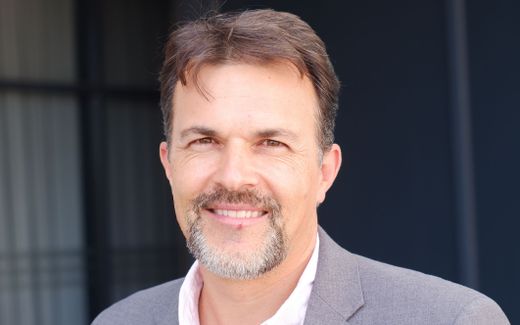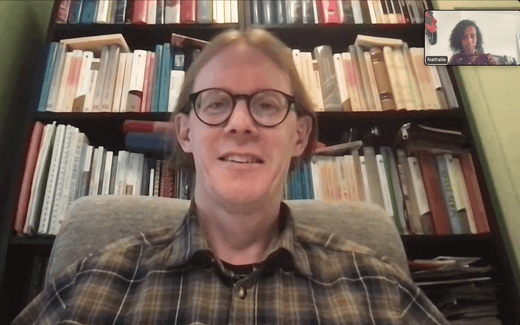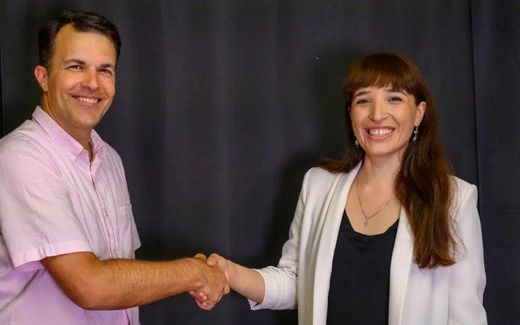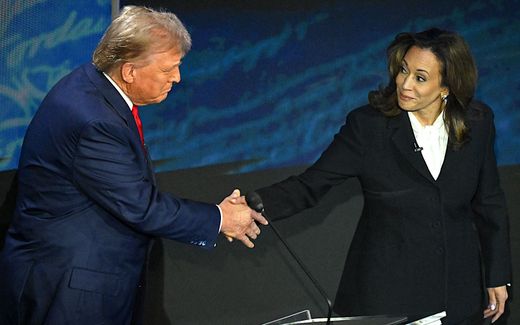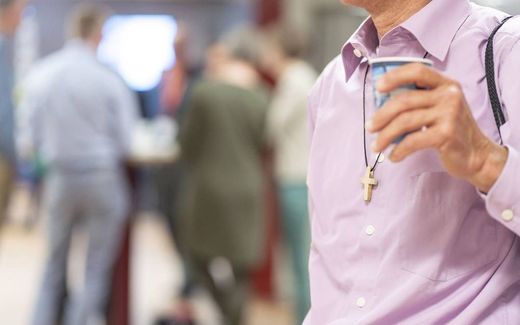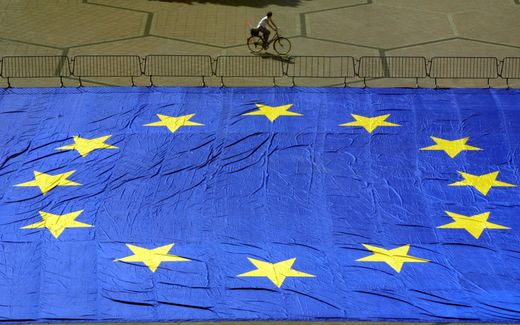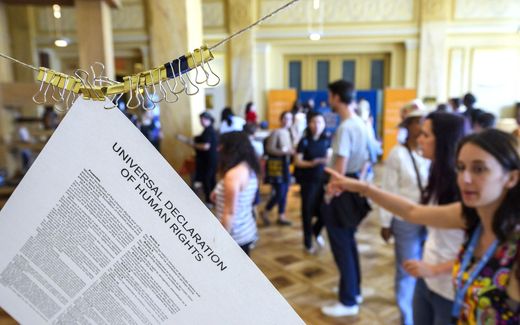Marc Jost has a homosexual father, but defends traditional marriage
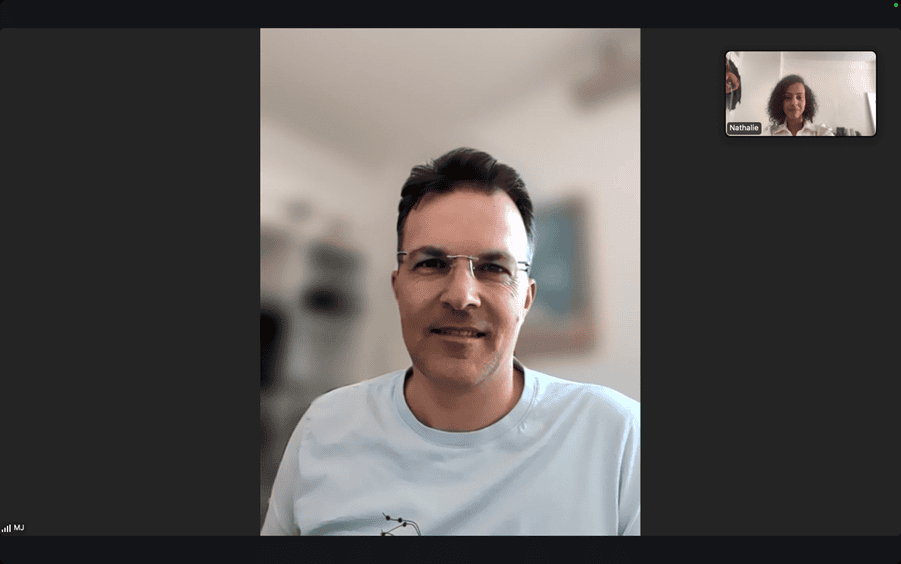
Marc Jost from Switzerland during the interview. Photo CNE
Christian Life
As a student, Marc Jost lived in South America. There, he was confronted with terrorism, corruption and violence. His experiences shaped his life forever, the Swiss politician says.
How would you describe your view on life?
“One of the most important values for me is human dignity, that we honour and love our neighbour as ourselves and that God is the key behind this principle. Other values come from this, like the way we treat each other, justice, mercy, solidarity and creation care. I try to be reliable, transparent and credible so that when people hear and see me, they know who I am and what I would do.”
“My faith really gives me gratefulness and inner peace.”
What does your faith mean to you?
“My faith impacts every sphere of my life: how I start every day with prayer reflection, my relationships in my family, and my work, for example, how.
It also gives me a lot of inner peace with the many challenges and problems of our lives. I see the way God has been with me through all these years; it really gives me gratitude.”
What shaped this journey?
“As a young adult, I wanted to study theology to know more about the Bible and understand it better. My vision was to become a teacher in a Bible Institute or theological seminary.
Therefore, my wife and I spent one year as students in Latin America, in Peru and Colombia. We assisted in a Bible Institute there for several months. During that time, we were confronted with social injustice, extreme poverty, violence, corruption and terrorism for the first time in our lives. Seeing these things determined the next steps in our lives.
About Marc Jost
Marc Jost was born on 6 February 1974 in Thun. He lives there with his wife Denise, whom he has been married to for 25 years, and their four children. Growing up, he always went to church with his family.
Jost worked as a teacher and later as a pastor and then became the leader of the Swiss Evangelical Alliance for 10 years. At the same time, he started doing politics on the Cantonal level. He was a member of the Cantonal Parliament for 14 years. Now, he has been in the Federal Parliament for over two years.
He is a member of the Evangelische Volkspartei, a small party with only two members in the Swiss Parliament.
Coming back, I wondered if I would get into politics in Switzerland or if I should do a ministry as a theological teacher abroad. So, I tried to work in a sphere where I could have an impact on global justice as a Christian. When I became a pastor, another Christian MP in Switzerland asked me if I would work for him as a personal assistant. That was an important moment for me, after being a pastor for seven years.”
What do you do?
“I serve on the National Council for the Evangelical People’s Party (EVP). EVP’s goal was to build bridges in society between these groups. Today, our party is present in most of the cantons in Switzerland, although it stayed small.
We try to develop our policies based on the Gospel. Our party is on the centre-left, social conservative. We are more conservative on societal and ethical issues and the protection of human life. However, we also feel a social responsibility when it comes to the weak and poor in society. I think this comes from the Gospel. When Jesus spoke in the synagogues in Nazareth, He focused especially on the weakest in society. We try to bring this into our policies, be it the children, the elderly, the sick, or the poor. We always try to take responsibility for the people at the margins in the economy and society.”
What do you hope to accomplish?
“Love for our neighbours is what motivates us; we want to have the common good or welfare of all people. We believe it is our job as Christians to be responsible for the whole of society. Every human being is made in the image of God, and He commands us to take care of each other. I see a deep Christian foundation behind the human rights we have in many countries in Europe.”
Tell me about your family life.
“My wife and I have four children. In our family, the church has always been very important. I think it is crucial that young adults reflect critically on their faith and how they want to live it. As parents, we are there to help them to develop their faith. It is encouraging to see how our children develop their own faith and conviction now. Music and sports are also important for us. We are all active in either music or sports. I do volleyball and cycling. In the wintertime, we always go on a ski holiday in the Alps, of course. And we often watch ski World Cup races on Sunday afternoon.”
You advocate for traditional marriage, but you have a father who is in a homosexual relationship. What is that like?
“It was a huge challenge when I was younger. We had difficult conversations in our family and worked on the issue and our relationships. Today, it is much easier, of course, because our relationship has become better. That period also triggered me to learn more about the issue. It challenged me to really reflect on my position and helped me to articulate my opinion in a respectful way. This helped with the fact that even people who disagree with me debate me in a serious way.”
“We may not share the same ethics, faith, and views on how life is lived, but we share a lot of other values.”
How is your relationship with your father right now?
“We have had a reconciled relationship for many years now. He is living one hour from our house, and we see each other every other week. He has a good relationship with our children as well. We are also on good terms with his partner. We may not share the same ethics, faith, and views on how life should be lived, but we share many other values. We learned to respect each other’s differences and live our relationship in a way that these differences do not hinder us from spending time together and as a bigger family. The same goes for the relationship with my mother and her new partner.”
How did you share this with your children?
“My wife and I thought a lot about this. When they were between 10 and 12 years old, we decided to tell them the story of my parents by having a moment with each child individually. I went to get coffee or ice cream with them and told them the story. They had the chance to ask questions, and when they became teenagers, they had a conversation about it with my dad. It was important to me that I, as a father, would be the first to share this story with them and, after this, get them into a conversation with my dad and other people.”
“Leadership is about serving and not about being the first to have the power.”
How would you describe your style of leadership?
“As a leadership of participation. I want the group of people that I lead to be a part of the decision-making and responsibility. It is also a leadership that is not based on power but based on trust and serving the ministry.”
How do you see the future as a Christian in your country?
“Now, I would need to explain what it means to be a Christian more often than in the past. Sharing the story of the church and the Bible repeatedly because people will not know what it means and what it is would be the biggest challenge to being a Christian in a society in Switzerland in the coming years. Another one is correcting corrupted Christianity, which is when people instrumentalise the Christian faith for their own means and interests. That happens when you say that you’re a Christian, but the way you live is against the Christian commandments. We see that in many parts of Europe.”
Six dilemmas
Blazer or jumper? “Jumper.”
Are you an evening person or an early bird? “Evening person.”
Tea or coffee? “Coffee.”
Would you rather use public transport or take a taxi? “Public transport.”
Read a book or watch TV? “Hmm, that's a hard one. Read a book.”
This one is going to be difficult for you, listening to music or doing sports? “Yeah, that is true, but I choose doing sports.”
Related Articles


